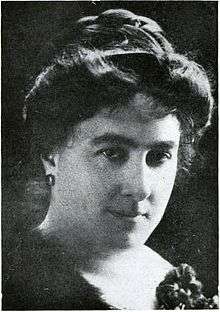Women in Uruguay
Women in Uruguay are women who were born in, who live in, and are from Uruguay. According to Countries and Their Cultures, there is a "very high proportion" of Uruguayan women participating in the labor force of the South American country. The Uruguayan legislation maintains that the women of Uruguay have equal rights to power, authority, and privileges". In reality, however, women are still not occupying "higher economic, professional, political, social, and religious positions".[4] In relation to the political arena, UN Women reported that a 2012 study made by the Inter-Parliamentary Union (IPU) ranked Uruguay as being "103rd out of 189 countries in terms of representation of women in Parliament".[5] Uruguay low ranking is partly due to its low political participation of women: only 16% of members of Parliament are women as of 2014. [1]
 Paulina Luisi was a prominent Uruguayan feminist leader, and also the first Uruguayan woman to graduate as a physician. | |
| Gender Inequality Index | |
|---|---|
| Value | 0.367 (2012) |
| Rank | 69th |
| Maternal mortality (per 100,000) | 29 (2010) |
| Women in parliament | 16% (2014)[1] |
| Females over 25 with secondary education | 50.6% (2010) |
| Women in labour force | 68% (2014)[2] |
| Global Gender Gap Index[3] | |
| Value | 0.715 (2018) |
| Rank | 56th out of 149 |
Notable women
One prominent Uruguayan woman is Paulina Luisi. Luisi was a leader of the feminist movement in the country of Uruguay. In 1909, she became the first woman in the country to obtain a medical degree and was highly respected. She represented Uruguay in international women's conferences and traveled throughout Europe. She voiced her opinion on women's rights, and in 1919, Paulina started the force for women's rights in Uruguay. By 1922, the Pan-American Conference of Women named Paulina Luisi an honorary vice president of the meeting and she continued to be an activist until Uruguay gave women the right to vote.
Domestic violence
Domestic violence is a very serious problem,[6] especially so-called crimes of passion, which continue to be tolerated under Article 36 of the Penal Code (The passion provoked by adultery) – Artículo 36. (La pasión provocada por el adulterio).[7] Since 2013, there have been ongoing political efforts to remove this provision from the Criminal Code.[8][9][10] Before 2006, perpetrators of rape could avoid punishment if, after the assault, they married the victim.[11] Uruguay's law against domestic violence is Ley Nº 17.514, enacted in 2002. [12]
Abortion
The abortion law of Uruguay is very liberal compared to the other Latin American countries. In 2012, Uruguay become the second country in Latin America, after Cuba, to legalize abortion on demand (during the first 12 weeks of pregnancy).[13]
Women in politics
Unlike most other Latin American countries, women are not very present in politics. Uruguay has one of the lowest percentage of women in politics in Latin America.[14]
See also
Further reading
Asunción Lavrin, Women, Feminism and Social Change: Argentina, Chile and Uruguay, 1890–1940 (Nebraska Press, 1995)
References
- "Uruguay | quotaProject: Global Database of Quotas for Women". QuotaProject. Retrieved 2017-04-26.
- "Labor force participation rate, female (% of female population ages 15-64) (modeled ILO estimate) | Data". Data.worldbank.org. Retrieved 2017-04-26.
- "The Global Gender Gap Report 2018" (PDF). World Economic Forum. pp. 10–11.
- "Culture of Uruguay - history, people, clothing, traditions, women, beliefs, food, customs, family". Everyculture.com. 2010-10-09. Retrieved 2017-04-26.
- "Archived copy". Archived from the original on 2013-05-10. Retrieved 2013-07-01.CS1 maint: archived copy as title (link)
- "Uruguay Human Rights | Amnesty International USA". Amnestyusa.org. Retrieved 2017-04-26.
- "Archived copy". Archived from the original on 2015-07-30. Retrieved 2015-06-14.CS1 maint: archived copy as title (link)
- "Uruguay no condena el homicidio por adulterio". Infobae. 2013-11-26. Retrieved 2017-04-26.
- "Violencia doméstica: proponen derogar artículo 36, sobre "pasión provocada por el adulterio" - uy.press / Agencia uruguaya de noticias". Uypress.net. 2013-11-26. Retrieved 2017-04-26.
- "Nuestro Código exonera homicidio por adulterio - Diario La República". Republica.com.uy. 2013-11-26. Retrieved 2017-04-26.
- Atlas of Gender and Development: How Social Norms Affect Gender Equality in non-OECD Countries. OECD Publishing. 2010-02-22. p. 134. ISBN 978-92-64-07747-8.
- "Archived copy". Archived from the original on 2014-12-01. Retrieved 2015-06-14.CS1 maint: archived copy as title (link)
- "Uruguay legalises abortion". Bbc.com. 17 October 2012.
- "Women in Parliaments: World Classification". Ipu.org. Retrieved 2017-04-26.
| Wikimedia Commons has media related to Women of Uruguay. |

